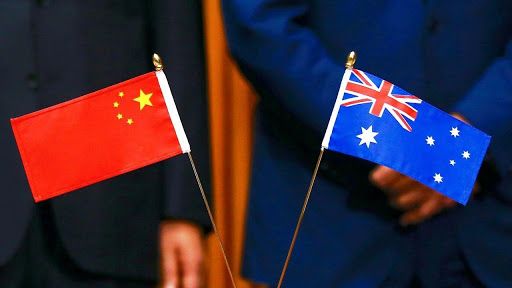Amid US-China tensions, Australia-China relations hit their lowest point in decades

A few minutes every morning is all you need.
Stay up to date on the world's Headlines and Human Stories. It's fun, it's factual, it's fluff-free.
After months of growing uncertainty, China’s ban on Australian imports cements the beginning of a broader crisis.
Australia’s relationship with China, its largest trading partner, is at its lowest point in decades amid increasing diplomatic tensions.
China is the largest consumer of Australian cotton, with the industry valued at around US$565 million. Now, Australia is saying that Chinese mills are refusing to process their imports in the latest in a series of recent restrictions that China has placed on Australian exports, including coal and other agricultural products.
While the motives behind the bans are unclear, some have alleged that they’re aimed at driving China’s domestic industries. Many critics also believe that the move marks the latest escalation in the growing trade war between the two countries.
The restrictions also come just days after Australia convened a meeting with Japan, the United States and India, a meeting slammed by Beijing as an “exclusive clique." China has long warned its citizens not to visit Australia due to alleged racist attitudes.
James Laurenceson, director of the Australia-China Relations Institute at the University of Technology, Sydney, wrote recently that “The Australia-China relationship is unravelling at a pace that could not have been contemplated just six months ago."
Origin of the tensions
This is not the first time diplomatic tensions between Australia and China have surfaced. Experts say anger and mistrust between the countries have been boiling for years.
Some tie the increased tensions to 2017, when Australia’s national security agency – the Australian Security Intelligence Organisation (ASIO) – warned of increased Chinese interference in national matters.
Officials had discovered donations made by Chinese businessmen to local politicians. In response, then-Australian Prime Minister Malcolm Turnbull introduced new laws aimed at stifling foreign interference. Beijing countered by suspending diplomatic visits.
Not long after, Australia became the first country to ban Chinese tech giant Huawei‘s 5G network rollout.
Tensions between the countries reached new heights in April 2020, when Australia called for an investigation into the origins of the coronavirus, which first emerged in Wuhan, China. In response to this probe, China immediately imposed tariffs on Australian beef, barley and wine.
Tensions reach new lows
Now diplomacy between the two countries appears to have reached record lows.
On August 14, Chinese authorities detained Cheng Lei, an Australian journalist for Chinese broadcaster CGTN, under the newly-imposed and contentious national security law.
The following week, Australia evacuated its remaining two correspondents working in China. The correspondents were rushed home overnight after Chinese police questioned the two regarding “national security" matters.
“It’s extraordinary, I think it’s unprecedented," Bill Birtles, one of the two correspondents evacuated, told the Australian Broadcasting Corporation (ABC).
“It felt very, very political, I felt like a diplomatic tussle in a broader Australia-China relationship more than anything specific related to that case."
After months of growing uncertainty, China’s ban on Australian imports cements the beginning of a broader crisis.
The restrictions are proving exceptionally challenging for Australia, as the continent has become increasingly dependent on Chinese trade over the years. The ban targets more than US$120 billion of goods, with China accounting for nearly one-third of Australian exports.
“It’s difficult to see how the current situation — the worst global recession in living memory — could be viewed as an opportunity for Australia to reduce its reliance on the world’s second-largest economy, and the only major economy to be recording positive rates of GDP growth this year," Jane Golley, director of the Australian Centre on China in World at Australian National University (ANU), told DW.
“It is simply not feasible to look elsewhere for replacing the Chinese market," Golley added.
Despite the effects of the ban on Australia’s economy, China remains largely untouched by the recent escalations. China is currently 95% self-sufficient in coal and plans to increase that to 100%, delivering a further hit to Australian coal miners.
Furthermore, China’s President Xi Jinping has vowed to reduce emissions and invest more in renewable energy in an attempt to reach net-zero emissions by 2060, reducing demand for traditional energy resources such as coal and gas.
Still, amid a pandemic, the effects of a trade war with Australia could undoubtedly have an impact on China’s economy as well. The country’s pledge to move to net-zero emissions is still 40 years away and Australia remains a significant player on the world stage.
Have a tip or story? Get in touch with our reporters at tips@themilsource.com




Comments ()